Using the method described in Recipe File: Soft Boiled Eggs where the water is brought to a boil, pot moved off the heat source, refrigerated large eggs placed into the water, lid replaced, and eggs shocked in ice water after a set duration of time, I tested various amounts of time spent in the just boiling water.
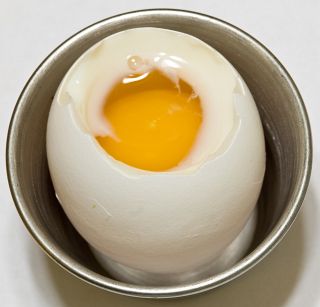 After 2 minutes: The thin albumen (egg white closest to the shell) has turned white and is semi-solid but the thick albumen (egg white layer nearest to the yolk) is still clear and liquid.
After 2 minutes: The thin albumen (egg white closest to the shell) has turned white and is semi-solid but the thick albumen (egg white layer nearest to the yolk) is still clear and liquid.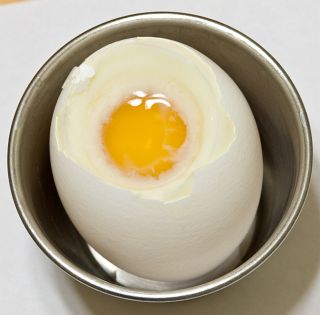 After 3 minutes: The thin albumen has solidified. The thick albumen is liquid but turning white.
After 3 minutes: The thin albumen has solidified. The thick albumen is liquid but turning white.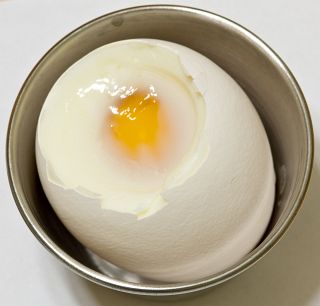 After 4 minutes: The thin albumen has fully solidified. The thick albumen is semi-solid.
After 4 minutes: The thin albumen has fully solidified. The thick albumen is semi-solid.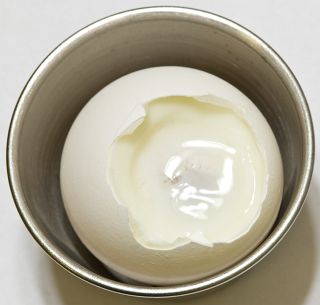 After 5 minutes: The whites are solid, but when tilted they still flow.
After 5 minutes: The whites are solid, but when tilted they still flow.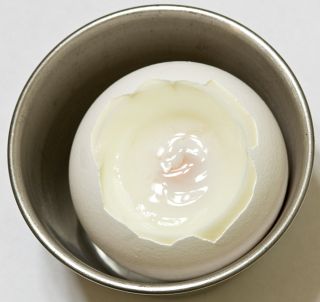 After 6 minutes: The whites are solid but not stiff (moves a little when the egg is tilted). The yolk has begun to thicken, but the egg still can't be peeled intact.
After 6 minutes: The whites are solid but not stiff (moves a little when the egg is tilted). The yolk has begun to thicken, but the egg still can't be peeled intact.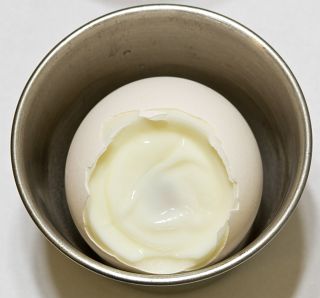 After 7 minutes: The whites are solid but not stiff. The yolk has thickened but flows well.
After 7 minutes: The whites are solid but not stiff. The yolk has thickened but flows well.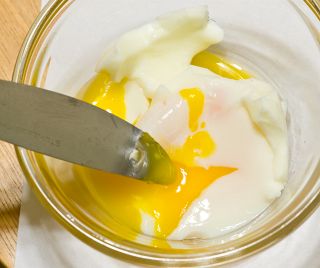
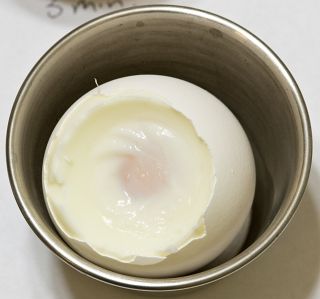 After 8 minutes: The whites are solid. The yolk has thickened and parts are beginning to no longer flow.
After 8 minutes: The whites are solid. The yolk has thickened and parts are beginning to no longer flow.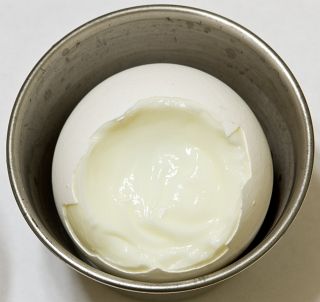 After 9 minutes: The whites are solid. Half the yolk has gelled (solid but still translucent - not yet the opaque yellow of a hard boiled egg) and half continues to thickly flow.
After 9 minutes: The whites are solid. Half the yolk has gelled (solid but still translucent - not yet the opaque yellow of a hard boiled egg) and half continues to thickly flow.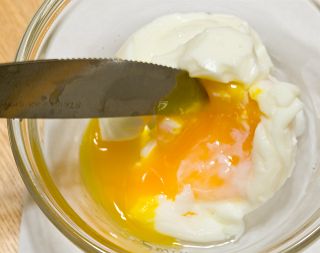
Related Articles

When I was testing the duration for hard boiling eggs, the jumbo ones took several more minutes than the merely large ones, with extra-large being somewhat in between. --SW
When I was testing the duration for hard boiling eggs, the jumbo ones took several more minutes than the merely large ones, with extra-large being somewhat in between. --SW
Great point. This test was done with large eggs. I think I'm going to have to do the same for extra large and jumbo. (And probably medium, small, and peewee...)
Sigh... and I thought I was done testing eggs. (My wife keeps shaking her head as I bring home several dozen eggs for testing.)
I mean, it probably isn't a straight line given the fact that you have an egg cruising up in temperature to meet the water which is cooling down along a similar curve, and Newton's law of cooling implies that the curve supposed to be exponential, but it's shouldn't be too bad. What's the mass ratio between jumbo and the smallest size you're interested in? As long as it isn't 10 or so, I wouldn't worry about it. If it is, throw in one more size in between.
What about the fridge internal temp? Or is somewhere around 38 fine?
It would be interesting to weigh various egg sizes from various sources to see if there is much variation.
Are the shells on brown eggs thicker? They seem to be for the ones I get and wouldn't that effect the timing as well?
What about the fridge internal temp? Or is somewhere around 38 fine?
It would be interesting to weigh various egg sizes from various sources to see if there is much variation.
Are the shells on brown eggs thicker? They seem to be for the ones I get and wouldn't that effect the timing as well?
In my experience, brown eggs to have stronger thicker shells, but not significantly where it would affect temperature rise in the yolk and albumen.
A volume of water per egg sounds good to me, and if we're real picky here, a pot with a water column equalling the diameter should result in the least amount of ambient heat loss. B)
Fridge temps should be fairly standard==about 35 to 37F. A couple of degrees should not make that much difference since the rate of heat absorption is greatest at the start of the heating cycle where the difference in temperature between the egg and water is the greatest.
Egg sizes are USDA standardized:
peewee=15 oz
small=18 oz
medium=21 oz
large=24 oz
extra large =27 oz
jumbo=30 oz
Has anyone actually ever SEEN peewee eggs in a market? I don't even see small where I am on Long Island. Medium is the smallest I ever see here.
Elevation would definitely make a difference since the temperature of the boiling water is lower than if you were at sea level. At 1,000 to 2,000 feet, the difference is small enough that you might not have to make adjustments but over 5,000 feet (where the water temperature is about 10 degrees F lower) you might need to add a minute or two.
http://nasaexplores.nasa.gov/show_912_teacher_st.php?id=03070985426
http://nasaexplores.nasa.gov/show_912_teacher_st.php?id=03070985426
Is that for a "runny" soft boiled or a "slowly flowing" soft boiled. There is less than a 2 degree difference in egg temperature between perfection and failure.
http://amath.colorado.edu/~baldwind//sous-vide.html
scroll down 1-2 pages and you'll see.
it's NASA - if they miss the moon by two degrees they'd just wave goodbye and hire a couple new astronauts . . .
'sides, _you have to provide the yolk temp you _want_ <g>
(And if I plan to make spaghetti at 11,000 feet while camping, I boil the noodles most of the way at home and pack them in pre-cooked. You don't want to find out how long it takes to cook pasta at that altitude when you're really hungry.)
Kitt
http://www.kittalog.com
utter waste of time. you could list all the home cooks in USA who could ever get a warm egg in their hand on a few sheets of paper.
it is correct that the air sack changes with freshness. but there are so few people that can "do fresh" at a point it could make any possible difference it's a moot point, imho.
Set the cups into a baking dish filled with warm water.
Bake at 375 deg until firm, 10-12 min; top with some cheese for the last 5 min if you like.
It makes a very soft and creamy egg.
why would you want the soft-boiled eggs to be peelable whole? seems like a whole lot of work, unless you do it sous vide. to be peelable, the white would be too firm to be really tasty. loses the gooey factor. I usually just spoon them out into a bowl. if i wanted whole soft eggs, i would choose to poach them.
no offense meant.
probably little offense sensed - but actually I think the "purpose" of the whole effort was to define/identify what temperature(s) produce what effect(s).
I agree with the basic statement:
soft boiled egg? what's with the "peel" thing?
....I whack off the top and put 'em on toast....
there is however a place in fin food fixins' where a veddy soft boiled gooey egg get puts over something even more tasty...
so past the "it's running all over the place" the temp guidance would be beneficial.
i just had two soft boiled eggs for breakfast. a drizzle of soy sauce, singapore hawker style, and 2 slices of toast with strawberry jam. Mmmm...
Start with cold water fully coveringand cold eggs together in a covered pot. Bring them to a rapid boil and set them off the burner for 4 minutes 30 seconds (sea level). Rinse in cold water to reduce temperature and drain. Eggs do not crack and are perfect.
small=18 oz
medium=21 oz
large=24 oz
extra large =27 oz
jumbo=30 oz
I think some decimal places may have gone missing here? I wouldn't call a 1 lb egg small..
(pedantic I know but what if somebody were using eggs as mass dampers in a skyscraper and didn't use sufficient eggs due to your inaccurate data? What would you say to the families of the casualties when the quake hit, hmm? Think of the children, just think of the children!)
(You'd have egg on your face for sure!)
Oh dear
http://uk.youtube.com/watch?v=PmrgCc7Fswk
Will all of the above work with brown eggs?
:-)
small=18 oz
medium=21 oz
large=24 oz
extra large =27 oz
jumbo=30 oz
I think some decimal places may have gone missing here? I wouldn't call a 1 lb egg small..
(pedantic I know but what if somebody were using eggs as mass dampers in a skyscraper and didn't use sufficient eggs due to your inaccurate data? What would you say to the families of the casualties when the quake hit, hmm? Think of the children, just think of the children!)
(You'd have egg on your face for sure!)
Oh dear
It looks like you quoted one of my posts. (Tue Aug 26, 2008 9:04 pm) Sorry for the confusion.
There aren't any missing decimals.
The ounces listed are PER DOZEN eggs of the given size.
Once my eggs had cooked the appropriate length of time, I took the pot of boiling water and sat it in the sink. Then I ran cold water into the hot water until it stopped steaming. Then I drained the water and filled the pot with cold water. These eggs slid out of their shells.
Is there an better method?
start in cold water
start in boiling water
when water boils turn off and allow to sit for x minutes
boil for x minutes
boil x minutes then cool for y minutes
everybody has a trick; nothing is easy <g>
but I'm with you - my method is to plunge them in ice water - real ice cubes floating around....
Whether or not the membrane sticks has to do with freshness. The fresher the egg, the harder it is to peel cleanly.
Whether or not the membrane sticks has to do with freshness. The fresher the egg, the harder it is to peel cleanly.
I am agreeing with this one. By using cold water you are enable to control the egg from breaking it. But I prefer hard boil than soft boiled.
As for cooking to a soft egg, try using an in pot egg timer. They are an acrylic resin "egg" that uses a color changing dye inside that is linked to temperature. You just place it in the pot with the eggs, and as temp inside the timer progresses inward you can simply see how far it's cooked.
What started out as a nice fresh raw egg often ends up overcooked. Sometimes to the point that the yolk is grey and rubbery.
If that sounds familiar then the Egg-Perfect Egg Timer is for you.
The Egg-Perfect Egg Timer is small, made of plastic and egg-shaped. It tells you when your eggs are soft, medium or hard-boiled by precisely sensing heat instead of time and this distinguishes this gadget from other egg timers.
You place it at the bottom of the pot with your eggs and as the eggs cook the timer darkens towards the middle and when it reaches the right line for you, your eggs are done to perfection.
It's one of those ideas that are so simple you wonder why it took so long for someone to think it up.
Most people love boiled eggs but not when they're overcooked.
Soft-boiled eggs always go down well with the children because they love to have them with toast soldiers. Dipping them into the hole at the top of their eggs and smothering them in warm creamy egg yolk.
If you find getting your boiled eggs the way you want them hard for you then check out Egg-Perfect Egg Timer at www.eggsyourway.com They cost £4.97 each.
Since the advertisement seemed relevant and might actually help some people, I left the first one in... but I don't understand why they felt it necessary to post a second one.
Let's see if next week we get another one - if so, even that first one is going to be treated as spam.
uhmmm, very gently. a soft boiled egg is going to be gooey inside - we call them "gooey eggs"
depending on how 'soft' is soft, it could be quite a trick.
why do you want to peel a soft boiled egg? I'm serious - I'm a big soft boiled egg on toast fan, what other goodies can I fix with them?
https://play.google.com/store/apps/details?id=com.mobication.EggTimerPro
I'm not a bot, nor spam. Just a lover of soft-boiled eggs cooked well consistently. My twitter is @SHEENtrainwreck. (Not looking for followers, just verifying identity)
Tell me it ain't so...
Why? - because a little vinegar / salt / baking soda / and the whole list of kitchen tale stuff . . .
does not "prevent" cracking.
Why does an egg crack when placed into hot water / boiled ?
the air inside the egg expands.
if the shell has been damaged - i.e. it's cracked already! - that internal pressure is enough to force out egg white before it sets.
a little bit of acid in the water - vinegar / lemon juice / other - will make the oozing white coagulate faster and hopefully keep it from threading out into the pot water. same "trick" is used for poaching eggs.
how fresh / old was the egg? fresh egg white congeals at higher temps . . .
how fast does your pot lose heat?
what was the ambient kitchen temperature?
there are many variables. a "one size fits all and works for everyone" simply does not work.
pick a method, experiment with the timing and take a note or two so you can do it again, reliably.
we got a new refrigerator - I had to adjust my soft boil egg times. the new fridge keeps colder than the old one.
neither. different methods are, uhhmmmm, errrr, different!